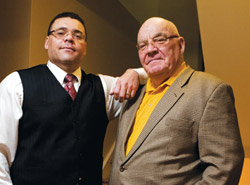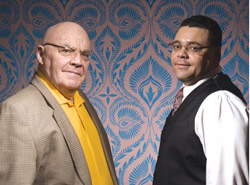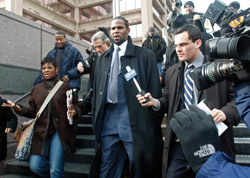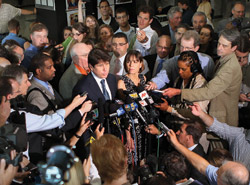The Son Also Rises: After Blago, Sam Adam Jr. Is Ready for a New Role

Photo of Samuel Eugene Adam, Jr., with father Samuel Forbes Adam, Sr., by Wayne Slezak
OK, call him an actor—or even a used car salesman—Sam Adam Jr. doesn’t care. He did, after all, minor in acting at the University of Wisconsin–Madison. At one point he could see his life going in that direction. But now he’s a defense lawyer, and a very good one. And all he cares about is what a jury thinks.
“What a used car salesman has to do is talk in such a way and bring points in that someone doesn’t see with a used car. You get them to see what you see, and the position you’re selling to them,” he says.
Most lawyers are afraid of looking crass. They think jurors won’t buy it, and their egos won’t let them go there. But Samuel Eugene Adam—his friends call him Sasha—thinks that’s his job: acting.
“To me, it’s theater. If you believe it, you get instant credibility with the jury.”
And it’s working for him. In recent years the Chicago attorney, teaming up with his father—longtime criminal defense lawyer Samuel Forbes Adam—has turned heads inside and outside Chicago with his representation of some of the city’s most illustrious criminal defendants.
Three years ago, R&B balladeer R. Kelly was facing prison on charges of having sex with a minor—counts based on a widely available video. Sam Adam Jr. walked him. Last year, the father-son duo represented Rod Blagojevich, the former Illinois governor, in his high-profile fraud and corruption trial. Blagojevich was accused, among other things, of trying to auction off President Barack Obama’s former U.S. Senate seat. Of 24 charges against him, federal prosecutors were able to nail down only a single charge: lying to the FBI. The jury was unable to reach a verdict on the other 23 charges.
And though the Adams aren’t representing Blagojevich in his retrial—the ubiquitous former governor has run out of money—Adam Jr. is still bothered by Blagojevich’s single conviction and thinks it’s his fault. Father and son believe that the prosecution underestimated them, mistaking their old-school bombast for a lack of acumen.
“Maybe the Adams want to say they were taken less seriously by the government, but maybe they want to rewrite history,” says a former Chicago federal prosecutor, now in private practice, who asked not to be quoted by name. “It doesn’t matter who’s on the other side; you can’t try a former governor without taking a case seriously.”
“They got a fairly amazing result,” says D. Peter Wise, a past president of the Illinois Association of Criminal Defense Lawyers and a name partner with Gates, Wise & Schlosser in Springfield, Ill. “For the prosecutors who tried this case, it might be fair to say they have a little egg on their faces. The statewide expectations were that this case was a slam dunk for the government.”
The U.S. attorney’s office for the Northern District of Illinois told the ABA Journal it had no comment.
That doesn’t mean that many in the Chicago bar don’t question the theatrical style favored by the Adams, both younger and elder, saying it isn’t appropriate for federal court.
Sasha has heard the critics, and he is unmoved. He rehearses opening and closing statements in his office, which is the living room of a three-flat he purchased near the University of Chicago. But when he performs in the courtroom, it is without a script—no cards or outlines for opening and closing statements—just a freewheeling one-man show.
“If I pay $200 to see Tony Randall in a play, and I go to the theater and he’s reading the script, I’m going to say, ‘What kind of play is this?’ A jury trial is nothing but theater. I can miss a point or two, but that’s OK. It’s just the experience.” OK, so he missed the point that Randall died in 2004.

Sr. and Jr. have long been a team. When Jr. was 4, his father started bringing him to court. The boy would watch Sr. try cases, playing checkers with a deputy during downtime. Photo by Wayne Slezak
OLD-SCHOOL LESSONS
On many levels that experience is one he has long shared with his father. As the child of a mixed-race marriage—his mother is black and his father white—he and his father attract both attention and curiosity in the courtroom, a fact that bothers neither of them. There is a picture of the two—father and son, both much younger—in matching suits, trench coats and fedoras. That attention seems to be exactly what Sam Adam Sr. intended from the time Sasha was very small.
Adam Sr., now 75, was already an established lawyer when he met Sasha’s mother while representing her then-boyfriend. His father married Carolyn Price in 1965 and raised their family in Beverly, a far-South Side, middle-class Chicago neighborhood. The area is known for Irish cops, firefighters and lawyers. But it’s also an integrated part of the city, and has been for some time.
Sasha was the baby of four kids. “When he was born I said to his mom, ‘Let me bring him up my way,” Adam Sr. says. And after his youngest learned to talk they spent a lot of time together. He started teaching his son the names of various animals. “He knew about 70 animals by the time he was 3. He was bored with Sesame Street,” the elder Adam says.
He started calling his youngest Sasha, the Russian diminutive of Alexander.
“I taught him to say it was his ‘nom de plume,’ just to be funny,” Adam Sr. says. “I’m not kidding—so many people thought he was a midget when he was a little kid because of the way he talked.”
On Saturdays and Sundays, Adam Sr. taught his children “lessons,” about things like geology. When Adam Jr. asked his father about the Civil War, they started reading Bruce Catton’s work, followed by family vacations to various battle sites.
“I don’t know how I got so lucky to have a dad like that,” Adam Jr. says, shortly after his father leaves the room.
Adam Sr. also molded his son in his own professional image. An oft-told story about the two is that when Adam Jr. was 4 years old his father started bringing him to court. The little boy would watch him try cases, playing checkers with a deputy during downtime.
If you’ve ever lived with a 4-year-old boy, the story seems hard to believe.
“No, it’s true,” the elder Adam insists. “I told him he had to be good, or he couldn’t come back.”
In court, both rely on an instinctive knowledge of what moves ordinary people. And a moxie that prosecutors find both hard to swallow and hard to anticipate. Their presence can turn a courtroom into a theater where unassailable evidence disappears into mitigating confusion and surefire convictions into reasonable doubt.
“Sam Adam Sr. harkens back to a time when things were very different. He has a certain level of fearlessness you don’t see in most lawyers,” says Keenan J. Saulter, a Chicago lawyer who was hired to work on Blagojevich’s defense team. “He’s someone who’s willing to go to war against anyone—the judge, the U.S. attorney. … Sam Adam Jr. has a lot of that in him; their styles are very similar.”
In July 2009, the younger Adam took on the defense of Joseph Biedermann, a confessed alcoholic accused of murdering his neighbor by stabbing him 61 times. At Adam’s direction, Biedermann admitted that he stabbed the neighbor, Terrance Hauser. Enter the “gay panic defense.”
Biedermann said that when a bartender refused to serve him, he accepted an invitation to go drink at Hauser’s apartment, around 1:30 a.m. Biedermann said he passed out on Hauser’s couch, only to wake up and find Hauser standing above him, holding a knife, threatening to sexually assault him. The government noted that Hauser’s apartment showed no signs of struggle, and he was stabbed in the lungs, kidney, pancreas, jugular and abdomen.
The defense nixed an offer to have the jury consider second-degree murder and went solely with first-degree murder. When a Cook County jury found Biedermann not guilty, critics questioned the defense as homophobic. Adam Jr. disagreed.
“This verdict wasn’t anti-gay, it was anti-rape,” he told the press. “Hauser threatened to kill my client. He simply fought back.”

Adam Jr. took the lead on the case of R&B singer R. Kelly. Photo by AP Images/Jerry Lai
MAKING NOISE
At 5 feet 10 inches tall and 38 years old, Adam Jr. still has a boyish face and often refers to himself as a chubby guy with glasses. He’ll also tell you that he’s the most “friggin’ insecure guy,” who didn’t think he could even get into law school. In court, he is almost always in a smart-looking, somber-colored three-piece suit.
Adam says that working with his father unquestionably gives him the bravery to do things in court that other attorneys won’t.
When he gets passionate about a case, which is often, he pounds the lectern or table, points a finger and waves his fists in a style reminiscent of the country’s great black orators, but with a flat Chicago accent similar to characters in Saturday Night Live’s “Bill Swerski’s Superfans” skits from the 1990s.
His father gets his point across in a similar manner. In practice since 1961, Adam Sr. says he’s never had a hard time getting clients. “I find you can get a lot of business in court if you make a lot of noise,” he says. “People equate noise with skill.”
Lawyers who know both say that Adam Sr. has made a lot of money over the years and has no need to continue practicing law, but he does it to be with his son.
“Sam knew the Fourth Amendment better than anyone,” says Marc W. Martin, a Chicago lawyer who as a law clerk met Adam Sr. The elder Adam, Martin says, was well-known for arguing a case not just to win the trial, but also the appeal.
As for the younger Adam, “Sasha is a very effective communicator. He doesn’t necessarily think like a lawyer,” Martin adds. “He’s a really friendly, outgoing people person. That’s why he’s effective in the courtroom.”
Lee Meihls, a Los Angeles jury consultant, worked with the Adams when they defended Kelly. Their greatest obstacle was a video prosecutors said was made by Kelly, showing him having sex with the alleged victim.
Adam Jr. “owned” the videotape, Meihls recalls. Neither Adam was impressed by the evidence, and both believed a jury of ordinary people would want to believe Kelly. In a typically bold move, the younger Adam asked permission from the court to show the video during voir dire. The judge turned down his request.
“He was fearless,” says Meihls. “What makes him so great is not just that he’s smart and tireless. It’s his passion and level of comfort in the courtroom talking to people. I’m not sure his ability to self-edit is as strong as other lawyers’, but that’s part of his charm and brilliance.”
“What separates him from a lot of lawyers is he doesn’t go to University of Chicago lectures or hang around at the Chicago Club,” says Saulter, referring to a private downtown social club founded in 1869.
“A lot of trial lawyers, if you were to ask them to debate an issue, they might be better at it,” Saulter says. “But when it comes to convincing 12 ordinary citizens of the issues, I’d put Adam Jr. up there. He really thinks about what people in the street are going to think about an issue.”
“Never try a case to a bunch of lawyers” is the advice his father gives. And that attitude received its toughest test in the case of Blagojevich.

The Adams stand behind former Illinois Gov. Rod Blagojevich and his wife, Patti. Photo by Getty Images
DEFENDING BLAGO
Blagojevich, a democrat, was elected in 2003 as a reform governor after his Republican predecessor, George Ryan, was convicted in a bribery scandal of his own. Before his arrest in December 2008, federal investigators had been gathering evidence that the flamboyant Blagojevich had been part of a widespread influence-peddling scheme that stretched through nearly every level of state government.
FBI agents finally arrested Blagojevich after wiretaps revealed what sounded like an ongoing auction for the U.S. Senate seat vacated by Obama. On tapes and transcripts released by federal prosecutors, Blagojevich could be heard describing as “f—ing golden” what he could get in exchange for the pending appointment.
But Blagojevich didn’t go quietly after his arrest. Predictably, he pronounced himself innocent and anxious to tell his side of the story in court. But he didn’t resign and he didn’t shut up. In fact, he embarked upon one of the most bizarre publicity barrages ever for a public official facing charges of corruption.
The first day of his impeachment hearing, Blagojevich was on Good Morning America, proclaiming his innocence to Diane Sawyer. When U.S. District Judge James Zagel blocked his efforts to join the cast of I’m a Celebrity, Get Me Out of Here! Blagojevich’s wife, Patti, went in his place. But later he was allowed to appear on The Celebrity Apprentice, where Donald Trump fired him after cameras revealed that the former governor did not know how to send emails or text messages.
And the Adams encouraged it. In fact, popular culture plays an important role in Sasha’s defense repertoire. He often records programs like the CBS hit sitcom Two and a Half Men and MTV’s raucous Jersey Shore to pull out references for his courtroom work. In the Kelly trial, the younger Adam peppered his arguments and questions with references from an arc of celebrity that reached from Dave Chappelle to Hannah Montana.
In the Blagojevich trial, the Adams made their client the celebrity.
“Jurors don’t like to convict celebrities,” Adam Jr. says. “We learned that with O.J., and O.J. was accused of doing a lot worse things than Rod was.”
“If you had Joan and Melissa Rivers in a room, you wouldn’t hear that much talk,” Adam Jr. told the jury about the former governor. “That’s just the way he is.”
Adam Sr. is even more blunt. “Every other lawyer tells their client to shut up, and what’s the result?” he asks. “They’re all sitting in jail. You’re just playing into the government’s hand when you don’t say anything.”
There were moments, however, when the young Adam wavered. It is common wisdom that federal courts are far more formal—and far less tolerant of the theatrical tactics that Sasha Adam enjoys.
In its opening statement, the government told the jury that Blagojevich was broke with significant debt, and that when Obama vacated his Senate seat the governor’s “golden ticket” arrived.
When it was Sasha’s turn, he paced the courtroom, alternating between shouts and whispers. If Blagojevich was such a crook, he demanded, why was he broke? Adam told the jury his client was naive, shallow and insecure, but he was no crook. And he promised that Blagojevich would take the stand to explain his side of the story.
But when he finished his opening statement, Judge Zagel warned him: “I don’t mind if you yell at the jury. If you yell at a witness, I’ll sit you down.”
The warning found its mark.
“He started to be a little shy in his questioning,” his father recalls. “We went to the bathroom during a five-minute break, and I said, ‘What’s going on here?’ ”
His son admitted that Zagel had him spooked.
“So what?” Adam Sr. said about the jurist’s warning. “Don’t be a pussy. If it’s not objectionable, you object.” The young Adam revved it back up. The government often objected, but he kept up the heat.
Although Adam had promised that Blagojevich would testify, Adam rested without hearing from him. Adam Sr. told reporters that the government hadn’t proven its case, so there was no need.
Some speculated that the Adams were afraid Blagojevich would wither on the stand. But there may have been a more practical, strategic reason.
“If the government is sure the defendant will take the stand, they will pocket some of the information that they could have put into evidence for the direct, thinking that they will use it for the cross-examination,” says Robert G. Morvillo, a New York City lawyer who defended lifestyle guru Martha Stewart.
Either way, telling the jury one thing and doing something else is very high-risk, and very few lawyers would do it, Morvillo says.
When the jury returned deadlocked on 23 of the 24 counts, U.S. Attorney Patrick Fitzgerald announced that there would be a retrial, but refused to take questions from reporters. The Adams, of course, were happy to discuss their views of the case.
First the son took the stage yelling, pointing and waving his fists, questioning why the government would spend “$25 to $30 million” on a retrial when “we have dead babies in the streets and police officers in uniform are day to day being shot and targeted by gang members.” Why not take the money for a retrial and give it to those communities, he shouted at the cameras.
Then came Adam Sr. “Listen, this guy Fitzgerald is a master at indicting people for noncriminal behavior,” he snarled. “This guy is going wild! This guy is nuts!”
Suddenly he started laughing, unable to conceal that he was now having fun. “Don’t forget that we didn’t put on a defense—none, zip, zero,” he said. “And they still couldn’t get a conviction. Fitzgerald thinks it’s a banana republic in Illinois or something.”
THE CLIENT HUSTLE
The Blagojevich trial may have given the Adams a national stage for their father-son act, but it hasn’t changed the fact that Adam Jr. still has to make a living. They briefly considered representing the former governor in his second trial, but the government is paying his defense this time and will fund only two lawyers.
Sasha thinks a second trial with only two, when the first trial had about 15, would have been taxing on his dad. “My dad doesn’t really like to hear this,” he says, “but he’s 75 years old.”
Adam Jr. admits that business went down significantly during the Blagojevich trial, including that from existing clients.
“People thought they couldn’t afford me anymore,” he says. “They can, believe me!”
He and his dad maintain separate offices. Six lawyers share space with Adam Jr. in his three-flat. He sends them cases in exchange for referral fees. For the cases he keeps, fees vary. “If it’s a kid who’s a first-time offender, I might do a drug case for $1,500, or as low as I can,” he says. For someone with a more checkered past, he’ll charge “a going rate.”
What might that rate be? “Whatever I think I can get,” he responds.
And here’s where Sasha’s ability to understand and touch everyday people once again comes into play. At the courthouse talking to clients—or potential clients—he exudes a certain boyish charm, like a favorite grandson or nephew who can be counted on to help bring in groceries or shovel your snow.
“How you doing, Mama?” he asks a client’s grandmother. Then he kisses her on the cheek, helping her with her coat. The client is a repeater. His mother hired Adam Jr. after seeing him at the courthouse, and Jr. got her son acquitted on charges of aggravated kidnapping and unlawful use of a weapon. More recently, the client was arrested for double attempted murder.
“How you doing, Sarge?” he shouts to an officer who comes up to shake his hand.
“Happy New Year!”
Sasha is in the Chicago suburb of Skokie for a hearing. And when he walks into the courtroom the audience—mainly defendants on bail and their wives, girlfriends or mothers—take note.
“You got to have money to hire a lawyer like that,” a young man murmurs.
“He did a good job on that Blagojevich trial, I’ll tell you that,” says a middle-aged woman sitting next to him.
While the admiration would be nice, it also seems like it could be exhausting to be Sam Adam Jr. In about two hours that day in Skokie, 15 potential clients approach him. Each one gets a card, and he tells them to call him later that day. “Is there anything else I can do for you?” he asks, wrapping up the conversation.
Later he is on the Edens Expressway, heading back from Skokie, justifying the sliding scale he uses in his business. After spending the better part of the day with Sasha, one can sense when he’s getting revved.
“Listen, that’s what criminal defense work is all about. It’s about helping the helpless. And if you have to support that by taking more money from the career criminals, it’s a necessary evil. A lawyer is a business expense for someone who engages in this type of activity on a daily basis,” he says.
He has one hand on the steering wheel of his red Mercedes E350, the other jabbing a finger in the air. In the background is the sound of smooth jazz.



